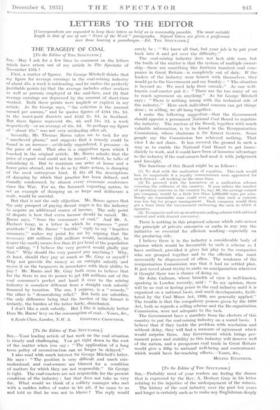[To the Editor of THE SPECTATOR.] Sin,— Four leading article
of last week on the coal situation is timely and challenging. You get right down to the root of the matter when you say : " The application of a long term policy of reconstruction can no longer be delayed."
I also read with much interest Sir George Mitchell's letter. He says : " The position is very difficult and much mis- understood, and coal-owners are blamed for a condition of matters for which they are not responsible." Sir George is right. The coal-masters are not responsible for the present condition of the industry ; but that does not take us very far. What would we think of a colliery manager who met with a sudden influx of water in his pit, if he came to us and told• us that he was not to blame ? The reply would surely be : " We know all that, but your job is to put your back into it and get over the difficulty."
The coal-mining industry does not lack able men, but the truth of the matter is that the system of multiple' owner- ship—there are something like fourteen hundred coal com- panies in Great Britain—is completely out of date. • If the leaders of the industry were honest with themselves, they would go to the Government and say frankly : The situation is beyond us. We need help from outside." As one well- known coal-master put it " There are far too many of us to reach agreement on anything." As Sir George Mitchell says : " There is nothing wrong with the technical side of the industry." Here each individual concern can get things done ; in selling, we all hang together.
I make the following suggestion—that the Government should appoint a permanent National Coal Board to regulate the industry. The nucleus of the Board, together with much valuable information, is to be found in the Reorganisation Commission, whose chairman is Sir Ernest Gowers. Some people say the Commission has achieved nothing. That view I do not share. It has covered. the ground in such is way., as to enable the National Coal Board to get imme- diately to work, and it could have been of immense advantage to the industry if the coal-owners had used it with judgement and foresight.
The functions of this Board might be as follows :
(1) To deal with the unification of royalties, This task would lose its magnitude if a royalty commissioner were appointed for each district—all working on the same lines.
(2) To proceed with the formation of a unification scheme covering the collieries of t lie country. If you reduce the number of operating concerns in Mir country to, say, 60, the average output per company would be it little less than 4,000,000 tons per year. Surely no reasonable nine could ever say that such a concern was too big for proper management. Each company would thou get a lease front the Government embracing the area in which it operates.
(3) To organise and set up an adequate selling scheme with national control and with district autonomy.
There is nothing in this proposed scheme which cuts across the principle of private enterprise or curbs in any way the initiative so essential for efficient working—especially on the producing side.
I 'believe there is in the industry a considerable body of opinion which would be favourable to such a scheme as I have outlined, provided it gives fair play to the compariiei who are grouped together and to the officials who must necessarily be dispossessed of office. The weakness of the reorganisation Commission was that it had no settled plan. It just roved about trying to make an amalgamation whereVer it thought there was a chance of doing so.
Sir John Cadman, whose breadth of view is well-known, speaking in London recently, said : " In my opinion, there will be no real or lasting peace in the coal industry until it is organised on a national basis, and until developments, facili- tated by the Coal Mines Act, 1930, are generally applied.". The trouble is that the compulsory powers given by the 1930 Act, both as regards a selling scheme and the Re-organiSation Commission, were not adequate to the task.
The Government have a mandate from the electors of this country to put the coal-mining industry on a sound basis. I believe that if they tackle the problem with resolution and without delay, they will find a measure of agreement which would surprise them, Any Government which brings per- manent peace and 'stability to this industry will deserve well of the nation, and a prosperous coal trade in Great Britain would give a fillip to national well-being and contentment which would have far-reaching effects.—Yours, &c., MINING ENGINEER.












































 Previous page
Previous page